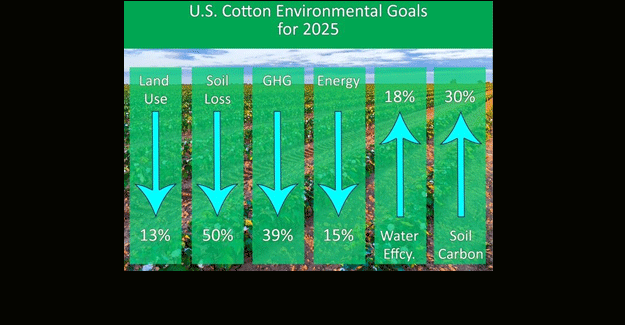
The US Cotton Industry Is Increasingly Turning Its Attention Towards Sustainability
Cotton Incorporated, the research and promotion company for US cotton producers and importers, has stated that it is extending its commitment to sustainability of cotton across the supply chain with the appointment of Jesse Daystar as vice president and chief sustainability officer.
At the same time, the National Cotton Council’s Cotton USA Sustainability Task Force is setting its first goals for 2025.
“Dr Daystar brings a wealth of experience and knowledge to this newly created role, which will oversee and coordinate our internal and external sustainability efforts,” said Berrye Worsham, president and chief executive officer of Cotton Incorporated. “As our company’s sustainability programs continue to gain momentum, Dr Daystar will be a valuable resource for the company and the cotton industry.”
Daystar is well versed in the complexities of sustainability research, particularly as it relates to cellulosic fibers, including cotton. His research has appeared in scholarly journals and his consulting work has led to the development of sustainability and chemical engineering tools, and certifications for clients including the U.S. Department of Agriculture, Department of Energy, Eastman Chemical and Piedmont biofuels.
Daystar’s experience includes sustainable chemical process development and efficiency management programme development with the National Council for Air and Stream Improvement, Mead West Vaco, Pesco-Beam Environmental Solutions and Kemira Chemical. Before joining Cotton Inc, he held the position of assistant director at the Duke Center for Sustainability and Commerce at Duke University, where he also taught. He earned a doctorate in forest biomaterials from North Carolina State University.
Meanwhile, the US cotton industry is setting goals aimed to build upon the strong environmental gains already achieved over the past 30 years with the goal of helping its members meet their current needs while improving the global environment.
“Our industry wants to be the supplier of choice for those who are committed to only buying cotton that is produced with sustainable and responsible environmental, safety and labor practices,” said National Cotton Council chairman Ronnie Lee. “That is the objective that was set by the Council’s Cotton USA Sustainability Task Force.”
Task Force chairman Ted Schneider, a Louisiana cotton producer, said the actual sustainability resolution that the Council adopted earlier this year called for the creation of the sustainability task force and specified that it collaborate with US cotton industry associations “on developing industrywide goals for measurable continual improvements in environmental stewardship, farm productivity and resource efficiency such as land, water, air, input, and energy use.”
Schneider said that among the specific goals being pursued by 2025 are reducing by 13 per cent the amount of land needed to produce a pound of cotton fibre, reducing soil loss by 50 per cent in balance with new soil formation, increasing water use efficiency by 18 per cent, reducing greenhouse gas emissions by 39 per cent, increasing soil carbon in fields by 30 per cent and reducing energy to produce seed cotton and ginned lint by 15 per cent.
“US cotton growers have achieved significant environmental gains over the past three decades,” Schneider said. “The goals are meant to continue that trend and to reinvigorate efforts through the setting of realistic targeted reductions.”
Dahlen Hancock, chairman of Cotton Inc, where scientists have worked diligently to develop and refine U.S. cotton’s sustainability initiative, said, “We believe the United States may be the only country in the world with these kind of specific, measurable, quantified goals.”
The Texas producer said the US cotton industry is using “Field to Market,” a comprehensive system for measuring crop production’s environmental impact and identifying opportunities for improvement. That system, which works across the entire agricultural supply chain, is grounded in science-based tools and resources, system-wide collaboration, and transparency.
Hancock, who is the former chairman of the Council’s export promotions arm, Cotton Council International, said CCI looks forward to “sharing with US cotton’s global customers the strides our industry will continue to make in providing the world with responsibly produced, quality fibre.”
Textile Excellence
If you wish to Subscribe to Textile Excellence Print Edition, kindly fill in the below form and we shall get back to you with details.













